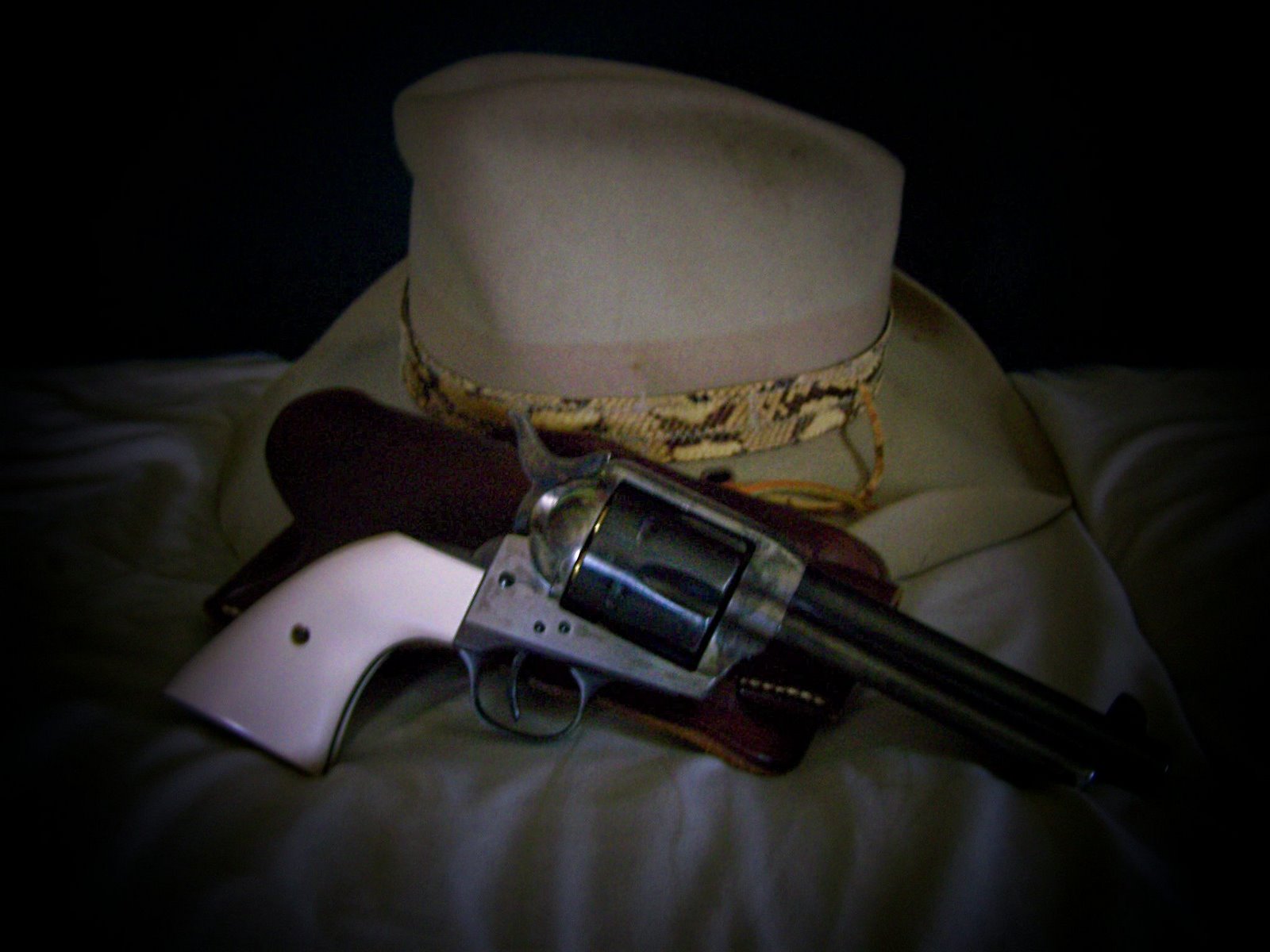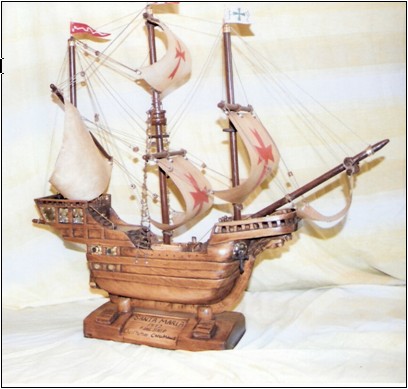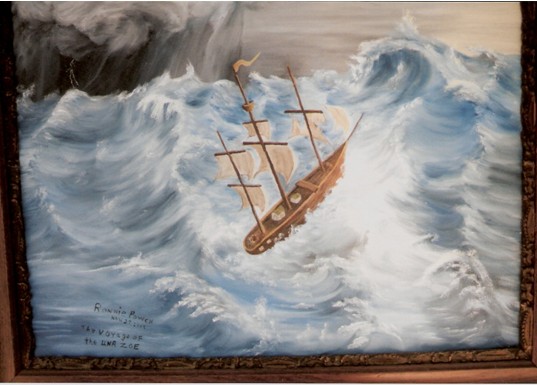 Butcher at Fort Albert Camp
Butcher at Fort Albert Camp
A Time to Remember
Farewell Winona
By Ronnie Powell
This saga began midday December Eighth, in Eighty Four on Ridge McKee overlooking the River Niangua. Butcher Redoak, Twinkles John and Banjo Boats bid a fond Farewell to Winona. They headed out on an outlaw trace, carrying everything they needed on their backs. The evening shadows were waiting in the timber, soon to be close on their heels. Their destination, Barefoot Pass.
Twinkles John carried a bad thirty six, six shot of powder and round ball lead. On Butcher’s right hip, hung a Forty Four revolver, the last of the Colt Dragoons. Banjo fondly carried a Fifty One Colt, the brass frame fashioned from a Macon County church bell.
They talked a lot, chawed tobacco and smoked a cigarette or two as they slowly made their way toward Barefoot Pass. Butcher held up a hand and pointed north and then beckoned them on. He led them through tangled vines and scrub brush along a trail barely visible.
Hours past and they came to the edge of an ancient limestone bluff; the North face of Ridge McKee. It was a place where only an eagle should be. Below they could see the River Niangua, a dark ribbon of water, three hundred feet down a treacherous slope.
A cold wind tugged at their packs and tried to chill their bones. But these hearty Ozark men laughed at the wind and hitched up their packs and started down the bluff.
“No armchair mountain man got the steel to be here, I reckon!” Twinkles John shouted and cussed a bit.
A devilish grin spread across Banjo’s face and he nodded, sat down and slid a ways down the perilous incline.
Butcher foraged ahead though a mighty vine and came at last to a rock outcrop and motioned for the other two to join him there. They dropped their packs and cut a chew, a figuring on resting a bit.
Suddenly Butcher squalled loud and clear. “Oh no.”
“What is it Butcher you’re fretting about?” You sound like a flatlander in a rain storm.
“My canteen came loose and is falling to the river,” Butcher answered. “Look below and you will se it among those rocks at river’s edge.”
“Yeah reckon I see it,” Twinkles replied. “We can do without it and besides it was better it than you, Yankee.”
“I ain’t leaving it behind, you mangy Reb and soon we’ll go down to where it lies. “But for now we rest a bit at Cave McKee around that ledge.
Several minutes later they stood at the entrance of the legendary cave a gawking at the dark wide expanse of its mouth. They could see sprits there a moving back into the darkness of the cave. Sprits of old they were, Indians, white men and a few they could not identify. Twinkles shivered, as did Banjo, but Butcher just grinned and dropped his pack.
“Settle down friends,” he said, and rest a bit. I got a tale or two to tell.”
They all sat down by a large stone near the entrance and drank cold coffee, chewed tobacco and smoked. Butcher recalled tales of pilgrims who had fallen to their death and of men who had been shot and buried on a lonely hilltop above them. He swore the tales were true.
It was time to go, for evening shadows were very close by and they hefted their packs and again headed down toward the River Niangua. They stumbled and slid along the steep slope and turned up river a looking for a place to spend the night. They would not make Barefoot Pass.
Twinkles stopped and growled like a bear. “Butcher,” he said. “Look up the slope to the south, a fine place to spend the night.”
“On the North face of Ridge McKee I ask? It will be blue cold up there my friend.”
Twinkles grunted and headed up the slope. “They ain’t no other place.”
When at last they reached the barren point, Twinkles dropped his pack and looked out over the land and grinned. It was a place where only God could have made such a view and all agreed it was home for the night.
Twinkles with flint and steel, struck a fire and soon it rose into the cold night air. Butcher, gathered wood and Banjo piled up bedding leaves. The aroma of biscuits, stew and coffee beckoned to the man and they sat down to feast and watched clouds race the moon.
It wasn’t long and night crept around them held back by the light of the camp fire. Higher and higher the flames rose and danced a rhythm as old as time, when other men of old rested as they would. To the south, near Ridge Liga, a hound bawled on trail of a fox or raccoon. Far below at river’s edge, coyotes sang and the night inched closer to the dwindling flames and sleeping men.
The first light of dawn was but a faint hue on the horizon when Butcher Redoak, Twinkles John and Banjo Boats cast aside their covers of fleece and goose down and they stood shivering for a time next to a kindling fire. A cold wind blew the flames higher until at last it warmed the hearty men. Soon bacon, taters and biscuits lay heaped on their plates warming both body and soul.
The travelers tarred not on that cold, barren hill and shouldered their packs and quickly passed from view into river fog toward Barefoot Pass. They came at last to a crossing at River Niangua, where fast moving water flowed around a bend. They stood for a spell, each to their own thoughts looking across the mighty stream to Barefoot Pass, a narrow trail between two sentries of stone.
Twinkles John hefted his pack and without a word strode into the icy waters of the river. He grunted and groaned a couple of times, tripped and stumbled, but with head held high and the water lapping around his thighs, Twinkles headed straight for shore. When at last he reached the bar, he stomped about, turned and grinned.
“Pilgrims, I say to you, cause you ain’t over here yet,” he shouted, “watch your step. That river will try and take you down. It will numb your legs and chill your bones. Now come on gents, don’t stand there like flatlanders.”
Banjo grimaced and picked up his pack and pushed the Fifty One deeper into its holster. He glanced at Butcher, and then walked into the cold water of River Niangua. He howled and hollered, but kept moving and soon staggered ashore and ran to where Twinkles sat before a fire.
The last to cross the swift water, Butcher grumbled, a bit ashamed to be the last one across and with an audience that would watch every step he took. He smiled real peaceful like and strode boldly into the water. He clenched his teeth, moaned a mournful sound and tipped his hat to Twinkles a looking at him. The Forty Four was now only an inch above the water, but he carefully moved on a shivering from head to toe. He found the bar and waded to shore and hurried to the fire.
“Well you ain’t no pilgrim or flatlander, Butcher,” Twinkles laughed. “That river is mean and mighty cold today.”
Put on the Pot and let’s warm a bit,” Butcher replied. I reckon then we’ll head through Bare Foot Pass and turn East to the Valley of the Moon, where I here there is Rendezvous and a shooting match. It will take most of the day to get there.”
How long did it take some have asked for Butcher Redoak, Twinkles John and Banjo Boats to trek to the Valley of the Moon, Corkry, Osage Fork and beyond and at last back to Barefoot Pass? Well I have heard it told a time or two, I guess it’s the truth, about two hundred years, give or take a day or two. Adios































